Metabolites
Homovanilic acid (HVA) and Vanillylmandelic acid (MVA) are analyzed using Asahipak ES-502N 7C (a column for weak cation exchange chromatography) by UV detection.
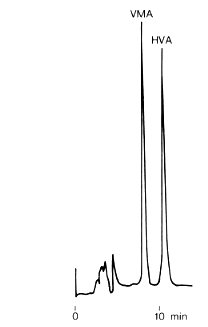
Sample : 100micro-L
HVA and VMA standards
Column : Shodex Asahipak ES-502N 7C (7.5mmID*100mm) Eluent : 50mM Bis-Tris propane(pH7.0 adjusted by HCl) + 200mM NaCl Flow rate : 1.0mL/min Detector : UV(280nm) Column temp. : 30deg-C
Vanillylmandelic acid (VMA) and creatinine in urea are determined by fluorescent detection using three columns, Asahipak ES-502N, GS-320 and NH2P-50 and column-switching method. GS-320 7E is an old type of GS-320 HQ.
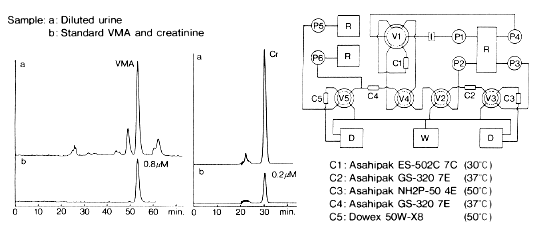
Sample : a. Diluted urine , b. Standard VMA and Creatinine
Columns : Shodex Asahipak ES-502N 7C (7.5mmID*100mm), GS-320 7E (7.5mmID*250mm), NH2P-50 4E (4.6mmID*250mm) Eluent : 0.35mol Propionic acid + 0.3mol NaOH in 1kg H2O(pH3.75) Flow rate : 0.7mL/min Detector : Fluorescence detector(Ex: 280nm, Em: 315nm)
Courtesy of Dr. Seki, Osaka University
Homovanilic acid (HVA) and Vanillylmandelic acid (VMA) in urine are analyzed using Asahipak GS-320 7E ( a multimode column ) and electrochemical detection (ECD).
GS-320 7E is an old type of GS-320 HQ.
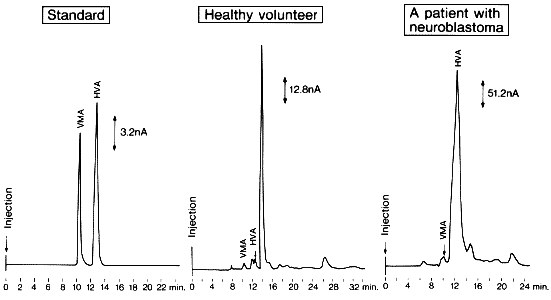
Column : Shodex Asahipak GS-320 7E (7.5mmID*250mm) Eluent : 0.5M Citric buffer + 0.1M KCl (pH7.0) Flow rate : 1.0mL/min Detector : ECD(800mV vs Ag/AgCl) Column temp. : 25deg-C
Courtesy of Dr. Iriyama, The Jikei University, School of Medicine
Uric acid and creatinine were analyzed using four columns Asahipak ES-502C, ES-502N, GS-310 7G and Asahipak GS-320 7C and column switching method. GS-310 7G is an old type of GF-310 HQ and GS-320 7C is an old type of GF-320 HQ.
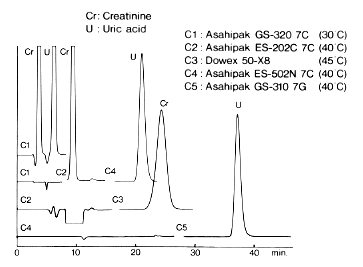
Sample :
Cr: Creatinine
U: Uric acid
Columns : C1 : Shodex Asahipak GS-320 7C (7.5mmID*100mm)
C2 : Shodex Asahipak ES-502C 7C (7.5mmID*100mm)
C3 : Dowex 50-X8
C4 : Shodex Asahipak ES-502N 7C (7.5mmID*100mm)
C5 : Shodex Asahipak GS-310 7G (7.5mmID*500mm)
Eluent : 60mM Propionic acid + 15mM Succinic acid + 60mM NaOH in 1kg H2O (for C1, C2, C4, C5)
50mM Propionic acid + 15mM Succinic acid + 60mM NaOH in 1kg H2O (for C3)
Flow rate : 1.2mL/min
Detector : UV(234nm, 290nm)
Column temp. : 30deg-C (for C1),40deg-C (for C2, C4, C5),45deg-C (for C3)
Courtesy of Dr. Seki, Osaka University
Some metabolites in urine have been added to the health check as special items in Japan recently. From the items, hippuric acid, methylhippuric acid (o-, m-, p-) and mandelic acid which are metabolites of toluene, xylene and styrene and creatinine were analyzed using ODSpak F-411 (a column for reversed phase chromatography) within 10 minutes.
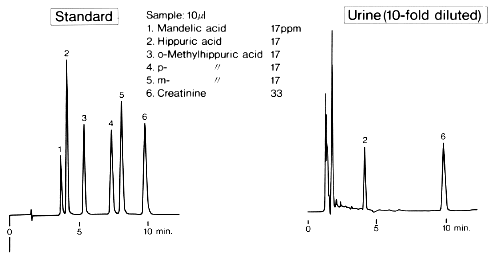
Sample :
1. Mandelic acid
2. Hippuric acid
3. o-Methylhippuric acid
4. p-Methylhippuric acid
5. m-Methylhippuric acid
6. Creatinine
Column : Shodex ODSpak F-411 (4.6mmID*150mm)
Eluent : [CH3CN/Buffer=12/88]+4.5mM sodium dodecyl sulfate
(Buffer: 20mM H3PO4+20mM beta-Cyclodextrin (pH2.5))
Flow rate : 1.0mL/min
Detector : UV(225nm)
Colomn temp.: 50deg-C
Some metabolites in urine have been added to the health check as special items in Japan recently. From the items, hippuric acid, methylhippuric acid(o-, m-, p-), mandelic acid which are metabolites of toluene, xylene and styrene and creatinine were analyzed using RSpak DE-413 (a column for reversed phase chromatography) within 10 minutes.
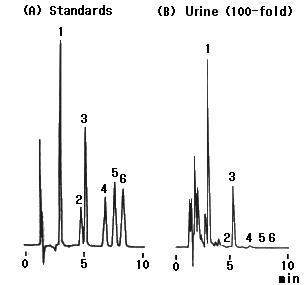
Sample : 10micro-L
(Left); Standards
1. Creatinine 20mg/L
2. Mandelic acid 10mg/L
3. Hippuric acid 10mg/L
4. o-Methylhippuric acid 10mg/L
5. p-Methylhippuric acid 10mg/L
6. m-Methylhippuric acid 10mg/L
(Right); Urine 100-fold diluted
Column : Shodex RSpak DE-413 (4.6mmID*150mm)
Eluent : CH3CN/Buffer=1/5
(Buffer: 20mM Sodium phophate + 20mM beta-Cyclodextrin + 4.5mM sodium dodecyl sulfate(pH3.2))
Flow rate : 1.0mL/min
Detector : UV(225nm)
Colomn temp. : 50deg-C
Polyamine and acetylated derivatives were analyzed using Asahipak ODP-50 4E (a column for reversed phase chromatography) with alkaline eluent.
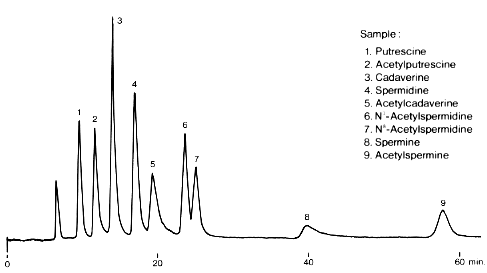
Sample :
1. Putrescine
2. Acetylputrescine
3. Cadaverine
4. Spermidine
5. Acetylcadaverine
6. N1–Acetylspermidine
7. N8–Acetylspermidine
8. Spermine
9. Acetylspermine
Column : Shodex Asahipak ODP-50 4E (4.6mmID*250mm) Eluent : 200mM Sodium phosphate (pH7.7) + 2.3mM Sodium 1-octanesulfonate Flow rate : 0.5mL/min Detector : Fluoresence(Ex. 345nm, Em. 455nm) (OPA post-column reaction) Column temp. : Room temp.
Courtesy of Dr. Kamei, The Tokyo Metropolitan Institute od Medical Science
Polyamines, also known as putrid or fixed amines, in foods are mainly generated as the result of denaturation by enzymes accompanying the fermentation or decomposition.
Formerly, such polyamines were analyzed by fluorescence derivatization using the precolumn or postcolumn method. However, the precolumn method is not easy to handle and the reaction product is not stable. With the postcolumn method, a complicated reaction system is necessary and it is difficult to obtain sharp peaks.
Here, a new derivatization method named the on-column derivertization method developed by Dr. Saito is shown.
Refer to Analysis of Polyamines by On-Column Derivertization
(Features of on-column derivatization method)
1) Only one pump is necessary.
2) Reproducible analysis is possible because polyamines are derivatized by a fluorescent derivatization reagent contained in the eluent.
3) Polyamines including histamine, which cause the decomposition of foods can be quantitatively analyzed simultaneously by isocratic elution.
4) Physiologically active amines, which have primary amino groups can be analyzed.
K.Saito, M.Horie, K.Nakagomi and H.Nakazawa, Anal.Sci. 8,675(1992)
Polyamines were analyzed by on-column derivertization using Asahipak ODP-50 4D.
Refer to Instruments for On-Column Derivetization
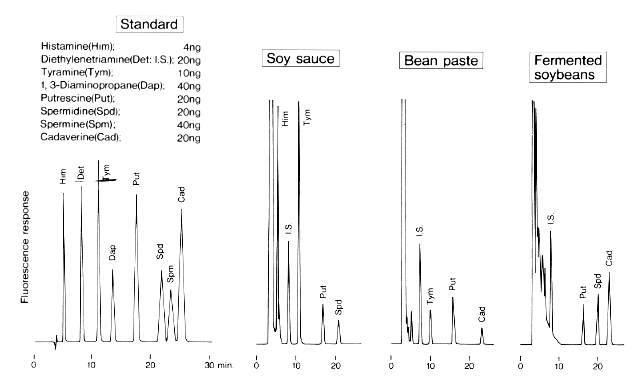
Sample : 10micro-L
Histamine(Him) , Diethylenetriamine(Det:I.S.) , Tyramine(Tym) , 1,3-Diaminopropane(Dap)
Putrescine(Put) , Spermidine(Spd) , Spermine(Spm) , Cadaverine(Cad)
Column : Shodex Asahipak ODP-50 4D (4.6mmID*150mm)
Eluent : 50mM Borate buffer (pH9.9) - CH3CN(77:23,v/v)
containing 2mM OPA(o-Phthalaldehyde) and 2mM NAC(N-Acetyl-L-cysteine)
Flow rate : 0.5mL/min
Detector : Fluorescence(Ex. 330nm, Em. 430nm)
Column temp. : 40deg-C
K.Saito, M.Horie, N.Nose,K.Nakagomi and H.Nakazawa, Anal. Sci. 8,675(1992)
Histamine was analyzed by on-column derivertization using Asahipak ODP-50 4E. When a stimulation, enough to cause inflammation, is applied to mast cells, they release histamine and other physiologically active substances as a result of their cell degradation. The analysis of histamine is widely performed using mast cells by bioassay to assess their inflammation and/or allergy.
This chromatograms show analysis of histamine released during the degradation induced by the compounds 48/80(A), mastobaran (B) and somatostatin (C). Histamine analysis is possible without the interference of coexisting substances.
Refer to Instruments for On-Column Derivetization
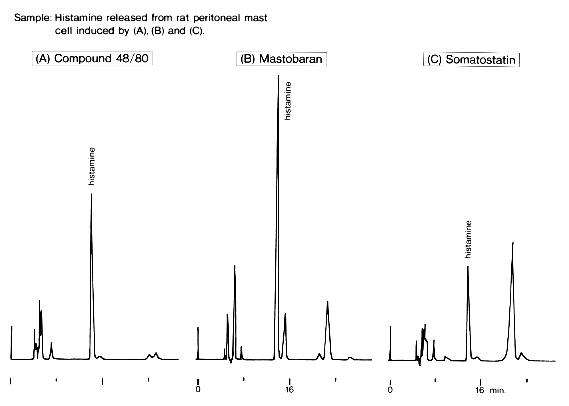
Sample : Histamine released from rat peritoneal mast cell inducted by (A),(B) and (C)
Column : Shodex Asahipak ODP-50 4E (4.6mmID*250mm)
Eluent : CH3CN - 50mM Sodium tetraborate(18:82,v/v) containing 1mM OPA(o-Phthalaldehyde) and 1mM
NAC(N-Acetyl-L-cysteine)
Flow rate : 0.5mL/min
Detector : Fluorescence detector(Ex 340nm,Em 450nm)
Column temp. : 40deg-C
K.Saito, M.Horie, N.Nose,K.Nakagomi and H.Nakazawa, J.Chromatogr., 595,163(1992)
Kojic acid was analyzed using RSpak DE-413 (a column for reversed phase chromatography). Kojic acid is a by-product in the production of koji which is malted rice and used for one of the raw materials of sake, Japanese rice wine. Kojic acid is an antibacterial metabolic microorganism.
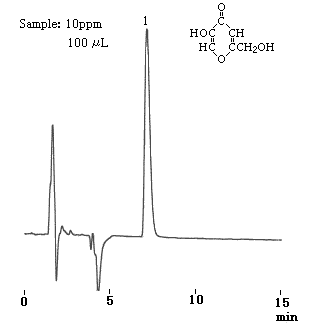
Sample :
1. Kojic acid
(5-Hydroxy-2-(hydroxymethyl)-4-pyrone
Column : Shodex RSpak DE-413 (4.6mmID*150mm) Eluent : 10mM H3PO4 aq. Flow rate : 1.0mL/min Detector : Shodex RI Column temp. : 40deg-C
Urea, creatine, creatinine were separated using ion (cation) chromatography column, IC YS-50. Urea and creatinine are known as final metabolites of nitrogen containing compounds.
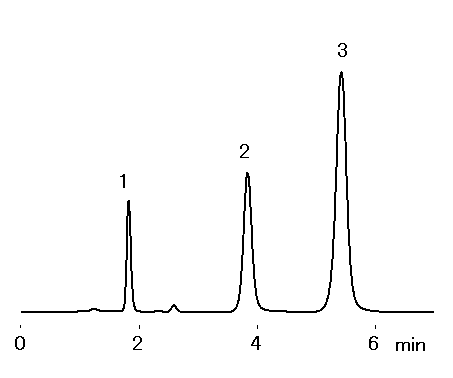
Sample : 10micro-L
1. Urea 0.06%
2. Creatine 0.001%
3. Creatinine 0.001%
Column : Shodex IC YS-50 (4.6mmID*125mm) Eluent : 10mM H3PO4 aq. Flow rate : 1.0mL/min Detector : UV(210nm) Column temp. : 40deg-C
